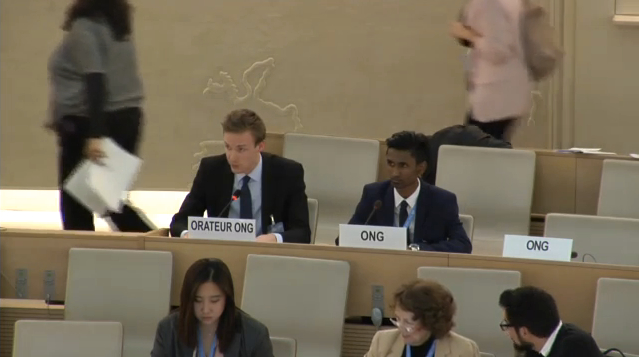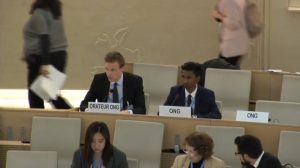Society for Threatened Peoples Human Rights Council statement re: Uyghurs

Society for Threatened Peoples, 13 March 2017

Thank you Mr. President,
I am speaking on behalf of the Society for Threatened Peoples to bring the Council’s attention to the worsening situation facing the Uyghur Muslim population from the Xinjiang Uyghur Autonomous Region of China.
The Uyghur community continues to be subject to highly restrictive policies in terms of religious freedom and freedom of movement and is now feeling the effects of a broadly enforced Anti-Terror Law.
As it stands today, the only legal religious practice that remains for Uyghurs is for those over the age of 18 and only within state-sanctioned mosques – upwards of 5000 of which have been reportedly demolished by the government since July 2016. All religious activities performed outside this venue are now considered “illegal religious practice”.
In addition, police ordered the passports of all residents in the region to be confiscated by early 2017 with no legitimate justification. The regional government has previously taken steps to severely limit mobility rights that add to increased police roadblocks throughout the region and expanded surveillance architecture.
An incredibly broad and widely condemned Anti-Terror Law was passed in December 2015 and we are already witnessing its effects.
As noted by the Special Rapporteur on the promotion of human rights while countering terrorism, the protection of human rights must be central to any constructive counter-terror strategy. Effective counter terror strategies and the protection of human rights are not conflicting goals, but complementary and mutually reinforcing.
We have unfortunately seen recent efforts that conflict with this important objective. In response to a recent attack in the region in February, thousands of military troops were dispatched in a clear show of force. Rather than clamping down on the entire Uyghur population for the actions of a tiny few, steps must be taken aimed at recognizing and substantively addressing root causes that give rise to grievances to begin with.
Cumulatively, these measures add to a climate already ripe with intimidation, fear, resentment and insecurity, and it is therefore tolerance and understanding that act as remedial forces that strengthen peace and buttresses human rights.
Only through continued and constructive dialogue can genuine progress be made, and that’s something we urge China and all UN member states to enter into as a first step.
Thank you.

